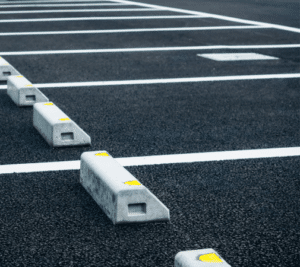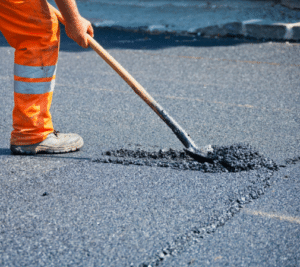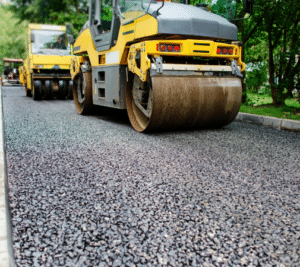Living in Tuscon, the blistering sun beats down on everything, causing damage. If you have crushed asphalt, you know the sun’s rays will cause it to fade and deteriorate with time. Visualize a parking lot that is incredibly pale gray and delicate. That’s in part because the sun’s beams are so potent.
The heat itself may degrade the pavement on sweltering days. Contrary to popular belief, extreme heat may soften asphalt, which is dangerous for vehicles and drivers.
One paving alternative is concrete, but concrete is not immune to damage from the sun. For a long time, even after it has been laid, the sun’s heat might cause problems for your concrete. The long-term effects of having your concrete driveway cook in the sun may be detrimental.
Whether you are considering paving your driveway with crushed asphalt or crushed concrete, either option has advantages, which we will cover in detail below.
What Is Crushed Asphalt?
Pavement milling, asphalt milling, and regenerated pavement are various names for crushed asphalt. It consists primarily of recycled gravel from asphalt roads and other construction operations.
After being crushed and screened, this becomes an asphalt cement-coated aggregate of the highest quality. It is both highly long-lasting and inexpensive.
Crushed asphalt might be the finest option if you are a homeowner on a limited budget needing high-quality driveway material.
Should I Use Crushed Asphalt For my Driveway?
More and more people are paving their driveways with crushed asphalt because of its low cost and easy maintenance. It’s no wonder this is the case, given that it is both cheap and environmentally beneficial.
Here are some considerations for homeowners considering crushed asphalt for their driveway.
● Cheap. Crushed asphalt is far cheaper than other driveway materials because it takes fewer resources overall. This includes fewer raw materials, less time spent producing the asphalt, and less money spent on labor.
● Percolation. Crushed asphalt is impervious to water, so it can keep your driveway dry even when it rains or snows.
● Superb adhesion properties. As a kind of recycled asphalt, crushed asphalt is made by combining recycled asphalt with tar. This implies that when it rains, your driveway will become more compact, reducing the dust and grime in the air.
● Appealing. Most homeowners are drawn to crushed asphalt because of its unusual yet appealing appearance, which is somewhere between an asphalt surface and a lovely gravel texture.
What Is Crushed Concrete?
One common material used to pave driveways is crushed concrete. Crushed concrete, like gravel, is comprised of finely divided concrete that has been reduced in size via crushing and grinding.
The use of crushed concrete in a driveway is appealing for various reasons, but there are also some drawbacks to consider. Let’s talk about the benefits and disadvantages of using crushed concrete as a driveway material, in case you’re considering it.
Where Does Crushed Concrete Come From?
Concrete demolition debris may be sent to a landfill, which will remain indefinitely or recycled. Since it is not naturally decomposable, concrete must be recycled to maximize its useful life. After a building is demolished, the concrete is transported to a recycling facility, which is crushed and processed to remove contaminants before reusing.
It may be used as an additive in fresh concrete or crushed and sold like regular gravel. Crushed concrete for driveways is often made from reclaimed pavement.
Why Is Crushed Concrete Used For Driveways?
The primary benefit of using this crushed concrete is its low cost. It’s cheaper than having new concrete poured since it’s made from recycled materials. Compared to natural stones, it’s also a lot cheaper.
A significant additional advantage of crushed concrete is its low environmental impact. This not only reduces the need for fresh concrete but also reduces waste sent to landfills. It recycles the concrete and keeps it from lying unused.
It may also be porous, depending on how you set it up. As a result, local storm systems are relieved of some of their workloads. This material’s adaptability and compatibility with other paving types also contribute to its widespread usage.
Crushed concrete may be used as a foundation for a driveway, and then your choice of surface materials, such as natural stones or new concrete, can be installed on top. Depending on the specifics of the design, this may help you save money on materials while also increasing the driveway’s permeability.
Several diverse applications may benefit from crushed concrete, which comes in many varieties. On the other hand, driveways can only be paved with 21AA crushed asphalt, 21AA crushed concrete, or 22AA crushed concrete. Other materials may serve as a foundation.
What Are The Drawbacks Of Using Crushed Concrete?
Improper installation will make it very hard to maintain. Crushed concrete that has not been stabilized before use has all the drawbacks of loose gravel. You’ll need to apply more regularly and level out your driveway so that bare areas and ruts don’t form.
The dust produced by crushing concrete may readily cling to and soil your cars. Driveways made of crushed concrete without pavers to increase their stability have substantially lower permeability.
Should I Use Crushed Asphalt or Concrete For my Driveway?
The advantages and disadvantages of crushed asphalt vs crushed concrete are quite similar. Your final decision will probably hinge on aesthetic considerations. The method of application is more crucial than the materials themselves.
Crushed asphalt or concrete that has not been stabilized presents maintenance challenges. This substance is quickly dispersed and broken down, necessitating regular maintenance to rake it back into place or its replacement.
Something else entirely is paver-stabilized crushed asphalt or concrete. These pavers may be set up in a flash with no effort. Simple excavation to a depth of roughly 10 inches is the first step.
Eight inches of washed angular stone (allows for drainage and detention) are compacted to the same level as the top surface. Afterward, asphalt or concrete is added, and the pavers are snapped into place. The setup is finished at this point.
Saguaro Asphalt is here for all of your driveway paving questions and needs. If you have more questions, contact us today!



